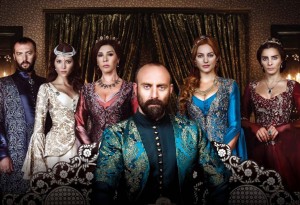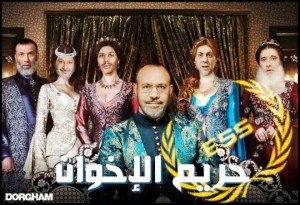
Every day in the women’s carriage on the Cairo Metro, mobile phones ring out with polyphonic melodies. Though the ringtones might sound like Arabic music, they are not; they are the musical introductions of Turkish soap operas.
Upon approaching a few young women in their 20s and 30s making their daily commute, to ask if they watch Turkish soaps, you might expect a couple to answer as the others shy away. But when the rest of the women got wind of the question, most of the carriage commenced an eight-stop-long discussion.
Despite the hustle and bustle in the train, the women formed a focus group in the middle of the carriage and said giddily in unison: “We all watch Turkish soaps, all the women in Egypt do.” Gauging the reactions of other women in the carriage, they too seemed to agree with the sweeping generalisation, but preferred to watch the crowd from afar. The women chattered about their favourite soap operas, musical intros and stars.
If people were to be quizzed on the 13 Egyptian presidential candidates after the 25 January revolution, they probably would not know half of them, but many in Egypt would effortlessly pass a test identifying some of the famous couples and characters in Turkish soaps—whose names have been changed in the dubbing process for an Arabic audience.
How the craze started
One needs to take a short trip back in time to understand how Turkish soap operas have ended up playing such a large part in Egypt’s pop culture.
In 2008, Turkish soap operas conquered Arabic media outlets through the Saudi owned media empire MBC (Middle East Broadcasting Centre) which broadcasts across the Arab world. MBC bought the show Noor (known as Gumus in Turkey) and aired it in an afternoon slot. When viewing figures shot up the show was scheduled to air during primetime and the craze began.
Despite the clichéd plot of Noor and its relative unpopularity in Turkey; the reception of the series in the Arab world was mind-boggling. Asi (another big hit) and a plethora of other Turkish soaps followed, creating an unprecedented popularity base for Turkish soaps in the Arab world in general, and among Egyptian women in particular.
In her paper Soaps for Everybody; the Image of Women in the Narrative of Soap Operas, Maria Bajner of the University of Pecs, examines the reasons why soap operas are so often viewed as “a feminine category.”
For Bajner, soap operas as a sub-genre of pop culture have acquired “feminine connotations” because since their introduction on radio in the early 20th century, they have specifically targeted a female audience, particularly housewives.
She points out how some critics consider this “women-only audience” approach condescending to women because it promotes patriarchal sensibilities and ascribes certain attributes to women; such as staying at home and being emotionally driven. Still other critics consider the act of viewing soap operas as liberating to women, as it provides a feminine alternative to the masculine narratives the media use.
However, these scholastic debates carry little weight when it comes to marketing the industry. Marketing and advertising specialists seem to subscribe to the “women-only audience” theory and strategise accordingly.
In an interview in 2008, Mazen Hayek, the director of marketing at MBC Group at the time, confirmed that Noor was moved to primetime to chase a broader female audience, not just those who stay at home during the day. According to Hayek, Noor’s finale was watched by 85 million viewers above the age of 15 in the Middle East and North Africa, 50 million of whom were women.
What is it about Turkish soap operas?
Dalia Ahmed, 32, is an assistant researcher in agricultural studies; and a Turkish soaps lover. She started watching them when she saw Asi by chance: “I watched a scene and liked it a lot, I was glued to my laptop screen for the next two days to finish the series, watching an episode after another.” Since then, Ahmed has watched countless series.
“I was attracted to the series because they have different plots, the sceneries are stupendous and the music is out of this world. They present many songs of their heritage to the point that we use these songs as ring tones for our phones, the acting performance is so good and the good-looks of their leading characters is a plus too.”
Unlike the regular audience who watch the soaps on privately owned channels such as MBC and CBC, Ahmed watches the series on the internet without the dubbing she abhors: “[The dubbing] distorts the emotions the actors try to convey, it really ruins the series. I wish they aired the series in the original language and with subtitles instead of dubbing. This way we catch a new language and can be entertained simultaneously.”
Ahmed believes her addiction to Turkish soaps has been useful: “Now, I know so much about Turkish culture and because I wanted to follow the celebrity news on Tuba [the lead actress in Asi] I’m learning Turkish at the Turkish cultural centre,” she said, grinning.
She is not alone. In fact, women from different age groups, with various levels of education and across classes, are addicted to watching Turkish soaps. A survey circulated on the Facebook page of the Fatma series showed that from a pool of 2,081 fans, 97% were women and 74% of them had a bachelor’s degree or higher.
Mehala Alaa, 21, a student at the faculty of commerce, explained some of the reasons for her addiction: “Turkish culture resembles ours, especially in the rural areas. Girls have curfews, they wear a headscarf and [Turkish people in general] respect their elders.”
She enjoys how the soaps portray the apparently romantic nature of Turkish men: “Their men are really romantic and appreciate their wives. They are very compassionate, always bringing flowers to their women. We miss these gestures in our lives.”
In fact, Alaa was influenced by the series in a telling way: “When I got pregnant I used one of the ideas I caught from one series. I went to my husband and gave him a pair of knitted baby shoes, but I was disappointed when he ignored the gesture,” she said, with a pathetic frown.
Not all women watch Turkish drama as religiously as Ahmed and Alaa. The spectrum is diverse. Amal Khaled is a 41-year-old lecturer at Ain Shams University who is not following the fad, but she has watched one Turkish series. Not by any means an addict, she is willing to watch for “the artistic worth.”
Khaled said: “[Producers] pay attention to details from alleyways to carpets to customs. There is a touch of sophistication in manners and attitudes even if the protagonist is poor. Not all Egyptian series have an artistic worth in them like that.”
Mariam El Prince, 14, is a student interested in art and poetry. Despite being critical of the obsession with Turkish soaps, she watched one: “I watched Fatma because of the cause and how it shed light on rape [victims] who are asked to marry their rapists. However, other series don’t always have a good message.”
The insights of these women on the Metro show the reasons for watching Turkish soap operas are diverse, rendering generalisations dangerous. Women watching these shows are not wasting their time; they are interested in Turkish culture, language, natural landscape and musical heritage. They are attracted to the high quality acting performances and values they can relate to.
In a recent article film critic Tarek El Shennawy commented on the factors that attract an Egyptian audience to Turkish soaps: “They film outside in the natural scenery, they are meticulous about customs and make-up and they simply have a ‘fresh’ flavour in ideas, scenes, events and in exhibiting beauty.
“Egyptian soaps have been following the same production patterns for a very long time, our drama production is exclusive to the month of Ramadan and we leave the rest of the year for the Turkish drama to dominate and that’s why the Egyptian and Arab viewers escape to Turkish drama.”
Egyptians turned to Turkish soap operas when most of the domestic alternatives were poorly produced and this should alarm Egyptian dramatists.
Soap operas, in general, address diverse aspects of life such as family ties, relationships and sex, and power and wealth. Turkish soaps follow the same recipe with a significant interplay between primary and secondary characters. Secondary character subplots keep the audience engaged. The conflicts, build-ups and mini-climaxes each episode occupy the audience’s attention.
Notably, the dubbing—using the Levantine dialect—was a success for Turkish drama.

It made the language of the soaps more familiar, after Mexican soap operas were traditionally dubbed in standard Arabic, creating a wedge between the audience and the show.
You cannot escape the inevitable
In Egypt many family members are forced to follow the soaps because the mother, sister or even grandmother is watching. This is the situation Ahmed Hossam, 22, faces. His mother watches the Magnificent Century and that’s why he has had to watch it too: “I did not like the past shows because of their clichés, but I liked the Magnificent Century because I’m interested in Ottoman history. For me, the show is politically intriguing and shows Turkey’s relationship with Europe. Still it’s not an obsession for me.”
Hossam believes that Egyptian women’s obsession with Turkish soap operas is to fulfill their emotional needs. He said: “Egyptian husbands are not romantic enough so the women tend to get their dose from these shows.” In Hossam’s opinion, the obsession is perpetuated because in each soap opera there is a “successful character,” female or male, that carries the torch from one series to another. People start watching a new series for that character they got to know in the previous series, this is when they become intrigued by another character and the cycle continues.
Adel Marei, a neuropsychiatry specialist from the Institute of Psychiatry at Ain Shams University, explains what might be the primary goal for soap opera watchers: “The human psyche has three components or modules which are emotions, behaviour and thinking. Emotions usually carry a higher weight and the most sought emotion is pleasure. To satisfy your pleasure centre [which is located in the brain], you do things like breathing, excreting, eating, performing the act of love and avoiding sources of pain.
“The reasons for watching may differ from one person to another depending on the person’s psyche, how she or he views society and how they interact with it, but each of us aims to be pleased and if watching a series will do it, you’ll act accordingly.”
Marei believes that there is no way to confirm the reasons people watch Turkish soap operas without surveying a sample of that population, but he went further in explaining the process that a soap opera follower may experience. “When you seek what gives you pleasure, one thing leads to another. You experience habituation. You want to follow closely what’s happening in the series. For some people, habituation turns into dependence.”
Marei does not like to use the word addiction because it is a big word with powerful implications, but he said: “When the series prevents you from performing other functions like socialisation, when you reach a point where your mood changes negatively because you missed an episode and when you feel something in your life is missing, that’s a red light flashing for dependence.”
Many Egyptians, and especially women I spoke to, escape the depressing political debates and talk shows aired non-stop on private TV channels and choose to watch soap operas instead. Dalia Ahmed, the girl from the Metro carriage said: “These soaps give us a respite from our daily problems, from the frustration of our political reality.”
Interestingly enough, escaping the Egyptian political reality is not always that easy. On the contrary, Turkish soap operas have recently become an arena for political projection.
During the presidential election campaign, social media users played with images of characters such as Karim, from the show Fatma, to show support for certain candidates— knowing that when other posters see their post they will relate their favourite character to a candidate.
Others have drawn on the plot of Fatma, and its resemblance to the Egyptian political reality, in their online networking. More recently, with the soaring popularity of the Magnificent Century, its characters have been used satirically to criticise the Muslim Brotherhood government.
El Shennawy made the point that “life in turkey resembles that in Egypt in terms of the social and economic situation.” The soap operas’ plots highlight poverty, unemployment and class issues. These scenes must, on some level, constantly remind the Egyptian viewer of the societal issues that face Egypt.
Turkey’s dominance reinvigorated
Despite the popularity of Turkish soap operas in Egypt, some of them were highly controversial when originally broadcast in Turkey. For example, Fatma was discussed in the Turkish parliament because of a storyline that dealt with rape and its legislation. At the time some Turkish parliamentarians feared that the image of Turkey could be smeared if soaps depict the country negatively.
A similar incident occurred when the Magnificent Century first aired. It was criticised by the Turkish Prime Minister Receb Tayyib Erdogan because it represented one of Turkey’s most influential sultans as “a sex maniac.” According to Al-Ahram, Erdogan was accused of artistic tyranny as result of his criticisms.
Nevertheless, soap operas are too culturally important for Turkey to dispense with now. They have become a kind of alternative diplomacy. You can make the case that soap operas boost Turkish soft power in the Arab world and among its neighbours in the Balkans; through its cultural influence, Turkey can seek to advance its political ties with Arab countries—perhaps even harking back to an Ottoman past.
Turkey’s failure to join the European Union so far has forced it to reconsider its Arab neighbours with which it shares religious, historical and linguistic ties. According to the journal Turkish Weekly, in 2011 Turkey earned more than $60 million from exporting soap operas. Viewing figures demonstrate that in over 20 countries across the Middle East and North Africa more than 100 Turkish soap operas have been aired. Tourism indicators in 2010 showed that the number of Arab tourists in Turkey shot up after airing Noor and in 2011 Istanbul became a popular destination for Arab weddings.
Omar Medhat, 22, is concerned with this cultural dominance. He wonders why Egypt airs these soaps on its channels: “I don’t understand the obsession with Turkish soaps. They are part of the soft power Turkey uses to enhance its role in the Middle East.
“We are always looking at Turkey as the perfect example for an Islamic country since it reconciled Shari’a with secularism. [We see it has] an interesting economic model … and is a defender of the Palestinian plight and a mediator in the Syrian crisis. This should not be the case because Turkey has its flaws.
“The soaps may have a good content and a superior quality, but that difference does not justify the obsession. We have almost replaced our own drama with Turkish soaps.”
Names have been changed to protect privacy





